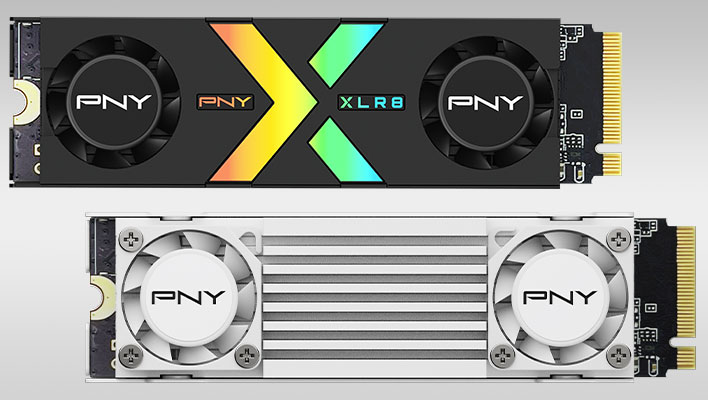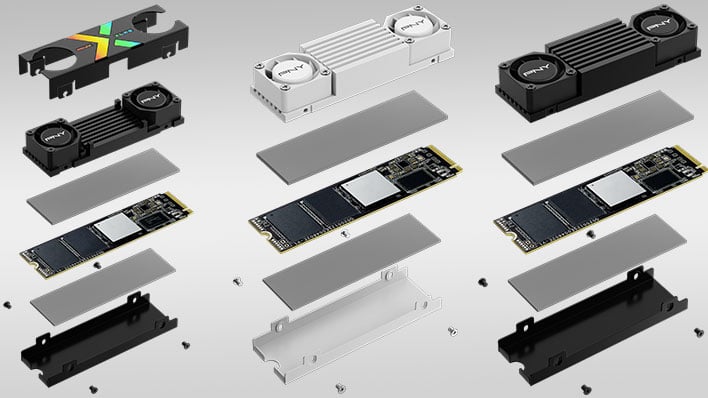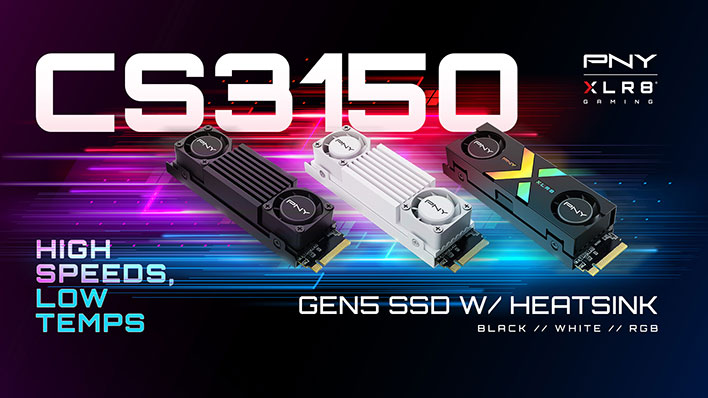PNY's New PCIe 5.0 SSDs Are So Fast They Come With Two Cooling Fans

We're still waiting for solid state drives (SSDs) built that take advantage of the PCI Express 5.0 bus to bombard the market, but so far there have been just a small handful of releases. They are coming, though. One of the challenges they bring with them is how to manage thermals. PNY's answer? Slap on a heatsink with dual cooling fans, as found on its new CS3150 SSDs.
The need for active cooling is something Phison talked about as far back as March of last year.
"There are lots of things that we’re doing to keep the SSD power within a reasonable envelope, but for sure, the SSDs are going to be hotter, in the same way that CPU and GPU got hotter in the 1990s. As we move to Gen 5 and Gen 6, we may need to consider active cooling," Sebastien Jean, chief technical officer at Phison, stated at the time.

PNY doesn't mention which controller its CS3150 SSDs are using (Phison's PS5026-E26, if we had to venture a guess-we've reached for clarification and will update this article when/if we have more information), but in terms of cooling, it doesn't really matter—proper cooing is needed to hit and maintain increasingly high data transfer speeds.
As it applies here, the CS3150 series is rated to deliver up to 12,000MB/s (12GB/s) of sequential read performance and up to 11,000MB/s (11GB/s) for sequential writes. The precise metrics vary by model, and specifically to the capacity on tap—those speeds apply to the 2TB models, while the 1TB variants check in with 11,500MB/s for reads and 8,500MB/s for writes, both of which are still incredibly fast.

Achieving those speeds, however, is where the active cooling comes into play. PNY is offering the CS3150 series with three different heatsink options—black, white, and black with RGB lighting—all of which employ tiny fans on each end of the drive. This requires plugging in a 4-pin power connector on the black and white models, while the black + RGB heatsink uses a 9-pin (USB) power connector to power the built-in fans and control the LED lighting.
There are some noteworthy caveats. One is that in order to take full advantage of the speed that's on tap, you'll need a platform that supports PCIe 5.0. You can still run these drives in PCIe 4.0 and earlier platforms, but you won't benefit from the full speed potential.
The other caveat is that sequential reads and writes are not necessarily indicative of real-world performance, depending on the task. Random read and write performance is a better metric for things like gaming, and PNY hasn't shared those figures. That said, we'd be surprised if those weren't fast as well. And as it applies to gaming, PNY says the C3150 lineup "takes full advantage of Microsoft DirectStorage."
PNY has set the CS3150 MSRPs at $179.99 for the black heatsink model at 1TB, and presumably the white one as well. Meanwhile, the black + RGB checks in at $189.99 for 1TB. No word yet on how much the 2TB models will cost.

